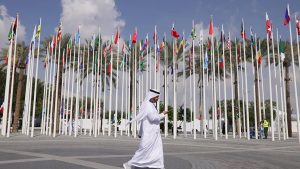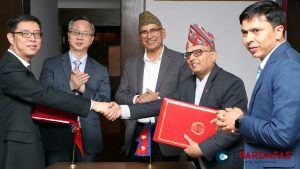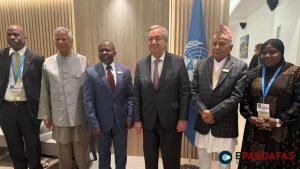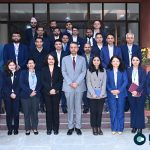
Nepal Caught in China’s BRI Crossfire: Diplomatic Push Sparks Concerns Over Sovereignty and Debt
Nepal’s preparation for implementing China’s Belt and Road Initiative (BRI) has ignited sharp political debates and fears of economic entanglement, revealing the fragile state of its domestic politics and regional diplomacy. An agreement between Prime Minister KP Oli and Nepali Congress President Sher Bahadur Deuba to review Beijing’s 2020 BRI proposal has exposed deep divisions within Nepal’s ruling coalition and fueled public skepticism over Chinese intentions.
The establishment of a four-member task force to revise China’s BRI implementation plan comes amid mounting concerns over the nature of financing and Nepal’s sovereignty. Prime Minister Oli, who is set to visit China in December, appears intent on advancing the BRI agenda. However, his coalition partner, the Nepali Congress, has opposed reliance on high-interest Chinese loans, preferring grants to finance infrastructure projects.
Debt Diplomacy or Development Aid?
China’s BRI, marketed as an infrastructure development initiative, has faced global criticism for its tendency to saddle participating countries with unsustainable debt. Nepal, with its precarious economy, is particularly vulnerable. Congress President Sher Bahadur Deuba and his party have raised red flags over high-interest loans, which could exacerbate Nepal’s debt burden and entangle it in Beijing’s economic orbit.
The Nepali Congress has been adamant about prioritizing grants over loans, citing fears of economic overreach and a potential loss of decision-making autonomy. This stance aligns with broader apprehensions expressed by global powers like India and the United States, who view the BRI as a strategic tool for expanding Chinese influence.
“High-interest loans could plunge Nepal into a debt trap. We must not compromise our sovereignty for infrastructure development,” a Congress leader warned.
Domestic Divisions and External Pressures
While Oli’s Communist Party of Nepal (Unified Marxist-Leninist) supports deeper engagement with China, the Congress’ resistance reflects a broader unease about aligning too closely with Beijing. Leaders within the Nepali Congress have suggested that the government strike a balance between China and traditional allies like India to maintain geopolitical equilibrium.
The bureaucratic resistance further complicates the issue. Multiple ministries have expressed concerns over Beijing’s proposed funding modalities, including blended financing models, which they fear could obscure true costs and risks.
Public Skepticism and Regional Ramifications
Nepal’s public, too, is wary of the BRI. Critics argue that Nepal’s political elite risks mortgaging national interests for short-term gains. In a nation where transparency is scarce, the selection of projects under the BRI framework has raised eyebrows.
“China’s promises often come with strings attached. Once you’re in their debt, it’s hard to get out,” remarked a political analyst.
India, Nepal’s longstanding ally, is closely watching these developments. Any significant tilt toward Beijing could unsettle regional power dynamics, further straining Kathmandu-New Delhi relations.
The Road Ahead: A Test of Leadership
As Prime Minister Oli prepares to visit Beijing, the task force must deliver a revised BRI draft addressing Congress’ concerns and public skepticism. The draft is expected to focus on infrastructure projects that align with Nepal’s development goals without compromising its financial stability.
Foreign Minister Arzu Rana Deuba’s upcoming visit to Beijing underscores the high stakes of this diplomatic engagement. Yet, the question remains: will Nepal’s leadership prioritize its people’s interests over Beijing’s agenda?
Nepal stands at a crossroads, facing a stark choice between leveraging Chinese funding for development and safeguarding its sovereignty. As debates rage on, the Oli government’s actions in the coming weeks will determine whether Nepal emerges as a cautious partner or a cautionary tale in China’s BRI playbook.
- Indian Army Chief General Upendra Dwivedi Meets PM Oli, Highlights Deepening Bilateral Defense Ties
- Bimalendra Nidhi: BRI Agreement Requires National-Level Discussion Before Signing
- PM Oli Urges Investment Amid Economic Reforms, Promises Stability and Prosperity
- Nepali Congress Rejects Loans Under China’s BRI, Pushes for Grant Assistance Ahead of PM Oli’s Visit to Beijing













Comments